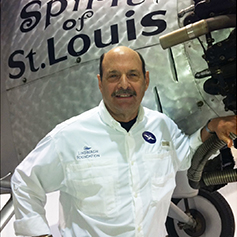 We wanted to find out more about the team behind Drone World Expo – what makes them tick, what motivates them and what are the secrets behind the success of the event. We interviewed Advisory Board member John L Petersen, Chairman of The Charles A. and Anne Morrow Lindbergh Foundation. John is an aviator and a professional futurist and in 1989 founded The Arlington Institute (TAI), a non-profit, future-oriented research institute where he now edits and publishes FUTUREdition. His aviation career began with flying attack aircraft off of aircraft carriers for the Navy during the Viet Nam war and evolved into ultimately building his own aircraft and flying aerobatic airplanes. Petersen is a past board member of the World Future Society and a network member of the Global Business Network, a fellow of the World Academy of Art and Science, and is a past member of the Global Agenda Council of the Geography of Innovation for the World Economic Forum.
We wanted to find out more about the team behind Drone World Expo – what makes them tick, what motivates them and what are the secrets behind the success of the event. We interviewed Advisory Board member John L Petersen, Chairman of The Charles A. and Anne Morrow Lindbergh Foundation. John is an aviator and a professional futurist and in 1989 founded The Arlington Institute (TAI), a non-profit, future-oriented research institute where he now edits and publishes FUTUREdition. His aviation career began with flying attack aircraft off of aircraft carriers for the Navy during the Viet Nam war and evolved into ultimately building his own aircraft and flying aerobatic airplanes. Petersen is a past board member of the World Future Society and a network member of the Global Business Network, a fellow of the World Academy of Art and Science, and is a past member of the Global Agenda Council of the Geography of Innovation for the World Economic Forum.
1. At what point in your career did you first become involved with UAS in a professional capacity ?
I have been a member of the board of directors for about 9 years. I became chairman about 3 years ago.
2. Can you tell us about the Lindbergh Foundation’s Air Shepherd anti-poaching programme in Africa – when did it start and what success are you having ?
The Air Shepherd program was begun by the Lindbergh Foundation as the result of learning about how regular airplanes could not fly at night to hunt poachers, were being shot at during the day by poachers, and that the poachers largely operated at night. It occurred to me that drones could be flown at night with infrared cameras that could see the thermal signatures of animals and vehicles and people and that if they were electric, would not be either seen or heard – giving anti-poaching efforts a significant advantage over the poachers. We found UAV & Drone Solutions, a South African company that had already invested almost $2 million in developing both aircraft and tactics and, at that time, had accumulated over 600 hours in testing. Before that testing, around 15 rhinos had been killed by poachers each months in the area of the tests. During the six months of testing the poaching completely stopped.
We are now flying four full-time teams in South Africa, Malawi and Zimbabwe and have just launched an Indiegogo campaign to raise funds to expand our operations to additional locations and countries. .
3. Do you pilot unmanned aircraft yourself ? It must seem a little tame after your military flying experiences…?
I am a pilot and fly full-size aircraft and have built an airplane, but I am not a drone pilot. Our Air Shepherd pilots have to go through 4-5 months of training and become certified licensed drone pilots in South Africa.
4. As a professional futurist, can you let us know where the industry will be in 5 years time ? Are we seriously going to see the skies full of Amazon and Google delivery drones…?
Drones are at the place where smart phones were about 15 years ago when they largely made phone calls and took pictures. In the ensuing decade the device has essentially become a very powerful computer that now will support many thousands of applications and functions. That is what is going to happen with drones. Not only will the airframe and control systems advance greatly, with better batteries, etc., but the number and kinds of sensors that will be carried by drones in three years are almost important to predict and imagine at this time. Everything is getting smaller and cheaper and more capable. So, yes, we will see Amazon, Google, UPS and FedEX drones being an integral part of the usual delivery systems of these companies.in a short time. They are all working on perfecting the technology.
5. There is now a wide variety of exhibitions and conferences about UAS in the USA. Why did you choose to support Drone World Expo?
Drone World Expo was the first drone conference to ask us to publicly tell the story of our Air Shepherd anti-poaching operations, for which we were very appreciative. They saw the value of our unique “drones for good” operation and provided us a great platform for telling our story.
